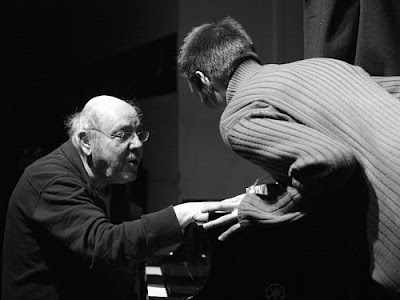I've always been a fan of Richard
Teitelbaum and of his records with the likes of Anthony Braxton. That
mood, that feeling, jazz with a nocturne feeling, jazz widened
through its extremes, jazz and electronics. I'm also a fan of a
record, issued few years ago, featuring Evan Parker and Grutronics.
So, I was happy to see Paolo Angeli, one of my Italian heroes,
playing with an electro-acoustic trio as in the album “Live at
Fasano Jazz”.
The Apocalypse Trio features Vincenzo
Deluci (trumpet), Camillo Pace (double bass) and Giuseppe Mariani
(electronics). Vincenzo Deluci (b. in Fasano) started studying
trumpet as a child, and took his degree in 1992. Finalist in
different contests, he won the International Contest 'Astor
Piazzolla' in Castel Fidardo as Best Musician. He is author of the Lp
“La Rana Dalla Bocca Larga” who sold 1000 copies in only 15 days.
After a car accident, who put him on a
weelchair, he came back to the music with the live show “VianDante”.
Camillo Pace (b. in Taranto) graduated as a bassist at Monopoli's
'Nino Rota' Conservatory and then he took a degree in jazz music
disciplines, specializing in history and musicology. He conducted
studies as ethnomusicologist in Kenya and South Africa.
Giuseppe Mariani, born in Noci, studied
trumpet as a child and graduated in 1999 at the 'Nino Rota'
Conservatory in Monopoli. Between 2001 and 2002 he lived in London
where he worked with saxophonist A. Wilkinson, drummer S. Ritchie and
bassist Bellatalla. Since 2002 he took interest in other musical
forms, and the relationships between improvised and electronic music.
 |
| The Apocalypse Trio |
Special guest on the record is Paolo
Angeli, an extraordinary musician who plays a self-built instrument.
Born in 1970, he started to play guitar at 9. He traveled up to
Bologna, where he started playing with different ensembles and
musician, one of whom is the great Fred Frith. His instrument, a
sardinian prepared guitar, is the result of Paolo Angeli's interest
in both avant-garde music and folk music.
This record start with 'Apocalypse', an
original composition of the trio that sees trumpet and guitar having
a conversation surrounded by electronic sounds popping by. Then is
the turn of another composition, 'Impro', who is very reminiscent of
glitch music, followed by 'A Child is Born' (Jones/Wilder) lunar and
crepuscular. Composer Ennio Morricone has his hommage paid by the
'Morricone Suite', featuring the themes from “Nuovo Cinema
Paradiso” and “Once Upon a Time in America”.
And then is the turn of 'Nature Boy' by
Nat King Cole, where one can enjoy the richness of the textures
provided by Paolo Angeli; the record finish with 'Procession', an
original composition by Deluci where improvised music takes the
foreground over electronics, dominated by the trumpet and the doodles
of the cello/guitar.
I'm enthousiast to hear such young
musicians expressing passion and knowledge, and the record will
become for sure one of the best albums of the year 2017. Listen and
enjoy this record, and then my advice is to recover the other records
I mentioned at the beginning of this post, to have a wider landscape
about the history of the encounters between jazz and electroacoustic
music.


